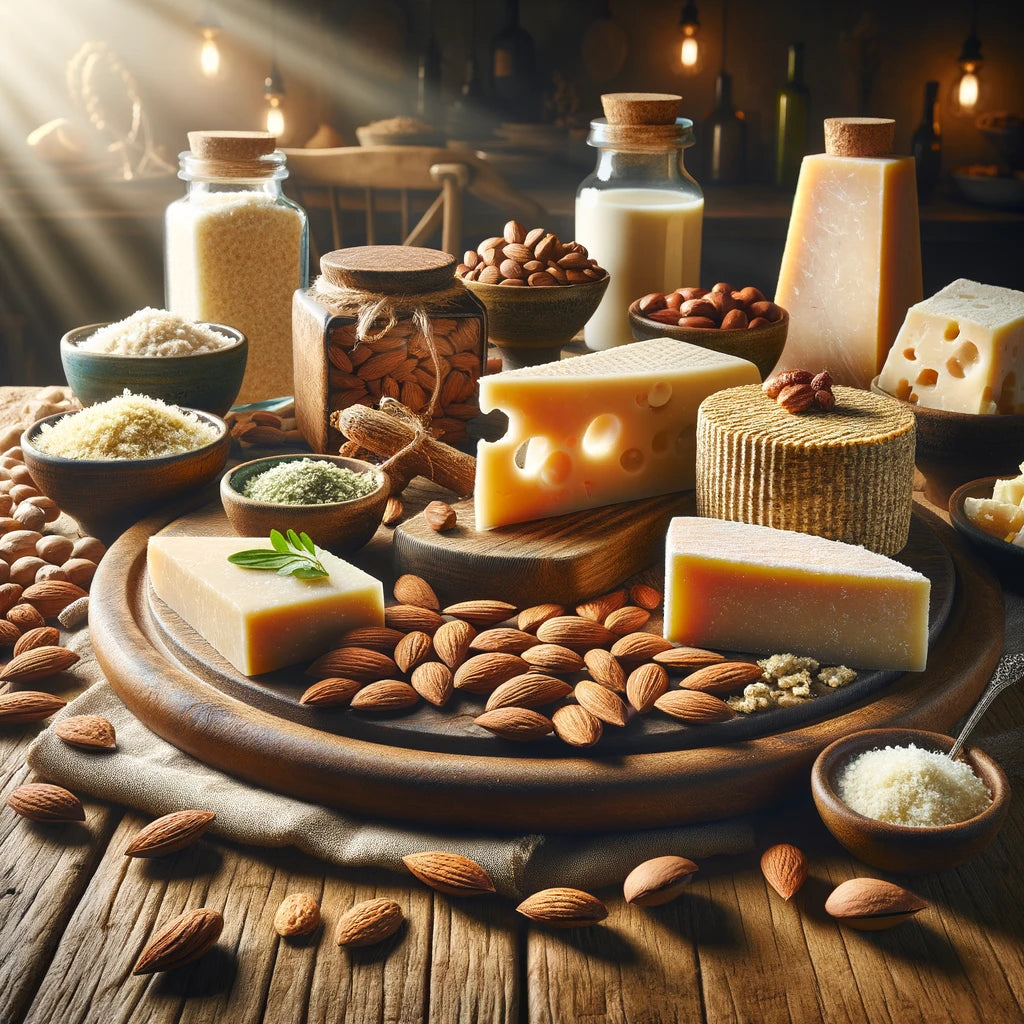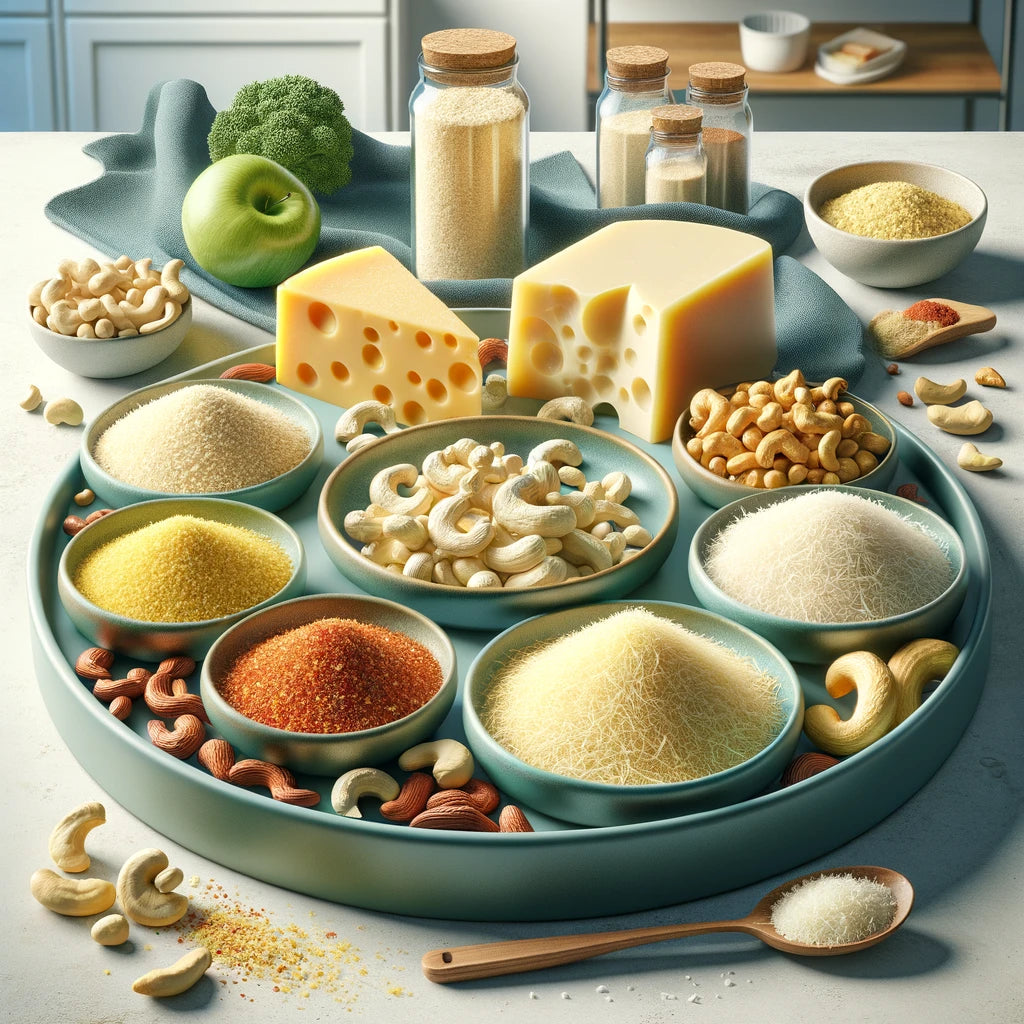Exploring Vegan and Plant-Based Alternatives to Parmesan Cheese
In the ever-expanding universe of vegan and plant-based diets, the quest for the perfect Vegan Cheese alternative is both an adventure and a challenge. Cheese, particularly parmesan cheese, is a staple in numerous cuisines around the world, celebrated for its unique flavor that enhances everything from simple pastas to elaborate dishes. Yet, for those adhering to vegan principles or plant-based diets, traditional cheese, made from animal milk, presents a dilemma. This guide delves into the world of vegan and plant based cheese alternatives, offering insights into making your own at home, exploring the health benefits and nutritional profiles, and highlighting the best store-bought options.
Key Takeaways
- Vegan Parmesan is Versatile: Made from nuts, seeds, or soy, vegan Parmesan can replicate the taste and texture of traditional cheese, offering a versatile ingredient for various dishes.
- Nutritional Benefits: Vegan Parmesan, especially those made with nutritional yeast and nuts, provides essential nutrients like B vitamins, healthy fats, and proteins.
- Environmentally Friendly: Choosing plant-based Parmesan alternatives supports sustainable practices and reduces the environmental impact associated with dairy production.
- Health Conscious: Vegan Parmesan offers a dairy-free, often lower-fat alternative to traditional cheese, suitable for those with dietary restrictions or pursuing a healthier lifestyle.
- Ethical Choice: Opting for vegan cheese alternatives aligns with ethical considerations regarding animal welfare and the impact of dairy farming.
Exploring Vegan Parmesan Alternatives
The Rise of Plant-Based Cheeses
The movement towards plant-based cheese products reflects a growing awareness of dietary health, ethical considerations regarding animal welfare, and environmental sustainability. Within this movement, Vegan Parmesan Cheese alternatives have garnered significant attention for their ability to replicate the beloved umami richness of their dairy counterparts without any animal byproducts.
Homemade vs. Store-Bought
For those inclined towards DIY culinary projects, homemade vegan cheese offers a rewarding venture. Utilizing base ingredients like nuts (cashews and almonds), seeds (such as hemp or sunflower), and nutritional yeast, these recipes can produce delicious, nutrient-rich cheese alternatives.
On the other hand, the convenience and variety of store-bought vegan Parmesan have made them a staple in many Vegan Shop. Brands like Violife and Follow Your Heart have mastered the art of crafting vegan cheese that rivals traditional Parmesan in both texture and taste, catering to the growing demand for high-quality vegan items in the marketplace.

A Spectrum of Flavors and Textures
The versatility of vegan Parmesan alternatives extends beyond just the base ingredient. From the nutty, creamy profiles of cashew based Parmesan to the bold, tangy essence of nutritional yeast variants, there's a vast palette of flavors and textures for consumers to explore. These alternatives are not just limited to sprinkling over pasta; they can be integrated into a myriad of dishes, offering a lactose-free, lower-fat alternative to traditional parmesan cheese blocks.
Creating Homemade Vegan Parmesan
Ingredients and Preparation
Crafting vegan Parmesan at home is simpler than one might expect, requiring only a handful of ingredients and a food processor. The base typically includes:
- Nuts or seeds: Raw cashews, almonds, or sunflower seeds provide a creamy texture and rich flavor.
- Nutritional yeast: Adds a cheesy, umami flavor that's essential for mimicking Parmesan.
- Garlic powder and salt: Enhances the overall taste profile.
The process involves blending these ingredients until they achieve a fine, crumbly consistency akin to grated Parmesan, offering a fresh, preservative-free alternative for various culinary uses.
Customization and Innovation
One of the joys of homemade vegan cheese is the ability to customize recipes to suit personal preferences. Whether adjusting the level of saltiness, adding different herbs for unique flavor profiles, or experimenting with llow fat cheese options, the possibilities are endless. This not only allows for a greater connection to the food we eat but also encourages a creative exploration of plant-based cheeses.
Health Benefits and Nutritional Profile
A Nutrient-Dense Alternative
Vegan Parmesan cheese alternatives stand out not just for their ethical and environmental benefits but also for their nutritional advantages. Nutritional yeast, a cornerstone ingredient, is a powerhouse of B vitamins, including B12, often supplemented in vegan diets. Nuts and seeds, meanwhile, provide essential fats, proteins, and a range of minerals, making vegan Parmesan a healthful addition to any meal.
Addressing Dietary Concerns
For individuals with dietary restrictions such as lactose intolerance, vegan cheese alternatives offer a digestible, enjoyable option. Moreover, these plant-based substitutes can contribute to a lower intake of saturated fats and cholesterol, aligning with health goals like heart disease prevention and overall wellness improvement.
Environmental and Ethical Considerations
Choosing vegan and plant-based cheese alternatives also reflects a commitment to reducing one's environmental footprint and supporting animal welfare. Dairy production is associated with significant environmental impacts, including greenhouse gas emissions and water usage. By opting for vegan cheese, consumers can enjoy their favorite flavors while also making a positive impact on the planet.
The Rise of Vegan Cheese
From its humble beginnings to the sophisticated options available today, vegan cheese has undergone a remarkable evolution. Once relegated to bland imitations, modern vegan cheese varieties now boast a diverse array of flavors and textures, captivating both vegans and non-vegans alike.
The variety of bases used in vegan cheese production, such as nuts, seeds, and soy, has played a pivotal role in this transformation. Renowned chefs and food experts have championed the use of nutritional yeast—a key ingredient that adds a cheesy flavor to vegan cheeses—ushering in a new era of dairy-free indulgence.
Nut-Based Parmesan Alternatives
One of the most popular methods for creating vegan Parmesan involves the use of nuts. Cashews or almonds, when combined with nutritional yeast, garlic powder, and salt, undergo a magical transformation in the food processor, resulting in a rich, flavorful alternative to traditional Parmesan cheese.
Recipe Highlight
Combine cashews or almonds, nutritional yeast, garlic powder, and salt in a food processor. Adjust quantities to taste and blend until achieving a fine, crumbly consistency resembling grated Parmesan. Sprinkle over your favorite dishes for a delicious vegan twist!

Seed and Soy-Based Options
For those allergic to nuts or seeking variety, seed-based alternatives offer an enticing alternative. Hemp or sunflower seeds can be transformed into a nut-free Parmesan alternative, providing a unique flavor profile. Additionally, soy-based options mimic the texture of grated cheese, offering another avenue for culinary exploration.
Store-Bought Vegan Parmesan
Several popular brands of vegan Parmesan grace the shelves of stores, offering convenience and flavor. These products boast a range of flavor profiles, from bold and tangy to nutty and creamy, catering to diverse palates. While homemade versions provide a personal touch, store-bought options serve as convenient alternatives for busy individuals. Price points and availability vary, ensuring accessibility for consumers across different demographics.
Health Benefits and Nutritional Profile
Opting for vegan Parmesan offers several health benefits compared to traditional dairy-based Parmesan. Vegan alternatives typically have lower saturated fat content and are free from cholesterol, making them a heart-healthy option. Nutritional yeast, a key ingredient in vegan Parmesan, provides essential B-vitamins, including B12, which is often lacking in plant-based diets. Additionally, the healthy fats from nuts and seeds used in vegan Parmesan contribute to overall well-being.
Environmental and Ethical Considerations
Choosing vegan cheese alternatives goes beyond personal health—it also has positive implications for animal welfare and the environment. Studies have shown that dairy production has a significant environmental footprint, contributing to greenhouse gas emissions and water pollution. By opting for plant-based alternatives, consumers can reduce their ecological impact and support more sustainable food systems. Additionally, choosing vegan options aligns with ethical considerations, as it avoids the exploitation of animals for food production.
Culinary Applications
Vegan Parmesan can be incorporated into a wide range of dishes to enhance flavor and texture. Sprinkle it over pasta, salads, soups, or roasted vegetables for an extra layer of savory goodness. Use it as a topping for pizzas or sandwiches, or incorporate it into homemade pesto or creamy sauces. The versatility of vegan Parmesan allows for creative experimentation in the kitchen, adding depth and richness to various culinary creations.
Conclusion
In conclusion, opting for vegan Parmesan offers numerous benefits, including improved health outcomes, reduced environmental impact, and ethical considerations. With a wide range of options available, from homemade nut-based alternatives to store-bought varieties, incorporating vegan Parmesan into your diet is both accessible and delicious. Whether you're a seasoned vegan or simply curious about plant-based eating, exploring the world of vegan Parmesan alternatives can open up a world of culinary possibilities without compromising on flavor or texture.








